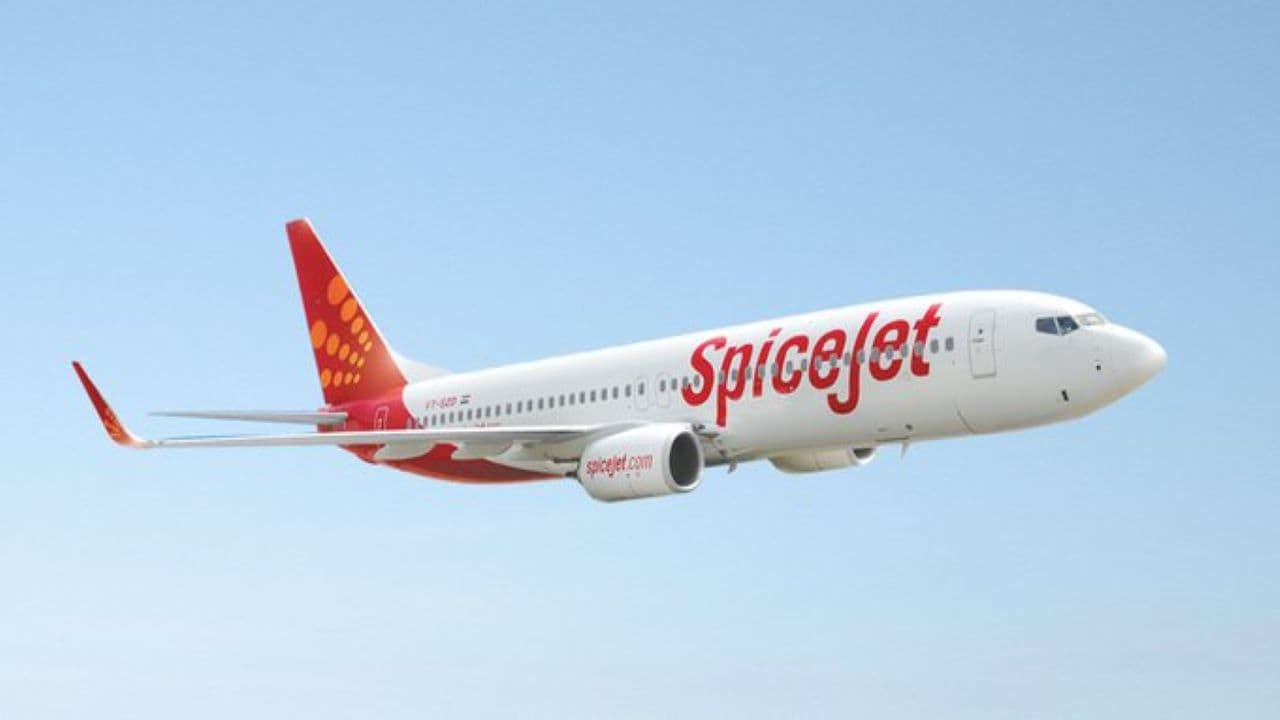Advertisement|Remove ads.
SpiceJet Q2 net loss widens to ₹621 crore on higher operating costs, grounded fleet expenses
The Passenger Load Factor (PLF) stood at 84.3%. Passenger Revenue per Available Seat Kilometre (RASK) improved to ₹4.04 from ₹3.91 in Q2 FY25. Shares of SpiceJet Ltd ended at ₹35.48, up by ₹1.42, or 4.17%, on the BSE.

Low-cost carrier SpiceJet Ltd on Wednesday (November 12) reported a net loss of ₹621 crore for the quarter ended September 2025, compared with a loss of ₹458 crore in the same period last year. Revenue for the quarter declined 13.4% year-on-year to ₹792 crore from ₹915 crore in the corresponding period of the previous year.
The results for the seasonally weak quarter were primarily driven by the impact of recalibrating dollar-based future obligations, carrying cost of grounded fleet, and additional expenses incurred towards return-to-service (RTS). Continued airspace restrictions also negatively impacted operations, leading to a sharp escalation in operating costs.
SpiceJet reported an operating loss of ₹297 crore during the quarter. The airline incurred ₹120 crore as grounded fleet carrying cost and ₹30 crore as RTS-related expenses. On an EBITDAR (ex-forex) basis, the airline recorded a loss of ₹203.80 crore in Q2 FY26, compared to a loss of ₹58.87 crore in Q2 FY25.
Also Read: SpiceJet revival stumbles despite cash infusion
The Passenger Load Factor (PLF) stood at 84.3%. Passenger Revenue per Available Seat Kilometre (RASK) improved to ₹4.04 from ₹3.91 in Q2 FY25.
Operationally, SpiceJet finalised a damp lease agreement for 19 aircraft, ungrounded two aircraft and returned them to active service, and secured $89.5 million in liquidity through its Carlyle settlement, unlocking $79.6 million in cash maintenance reserves and $9.9 million in credits. The airline also completed the full payment of $24 million to Credit Suisse.
Additionally, SpiceJet signed an interline agreement with Gulf Air to enhance global connectivity and achieved zero Level 1 findings in DGCA safety audits over the past year. It plans to add 19 aircraft under damp lease arrangements for the Winter schedule, has ungrounded one Boeing 737-8 MAX aircraft, and remains on track to more than double its fleet and triple its Available Seat Kilometres (ASKM) during the Winter Schedule.
Ajay Singh, Chairman and Managing Director, SpiceJet, said, “The September quarter was a period of consolidation and groundwork for our next phase of growth. While the results reflect short-term costs related to fleet revival and expansion, these are strategic investments that will start yielding results from the current quarter onward.
Also Read: SpiceJet slips into red in Q1 with ₹234-cr loss amid geopolitical turbulence
With aircraft additions already underway and our network expanding rapidly, SpiceJet is now on a clear trajectory towards stronger operational and positive financial performance in the second half of the year. Our loads of over 84% confirm strong demand for the product, and with the winter schedule now in operation, there are more high-yield routes in the pipeline.
I am also delighted to welcome Sanjay Kumar back to the SpiceJet family – his leadership will play a key role in accelerating our transformation. Q3 marks the beginning of a new phase of scale, strength, and profitability for SpiceJet."
Shares of SpiceJet Ltd ended at ₹35.48, up by ₹1.42, or 4.17%, on the BSE.
The results for the seasonally weak quarter were primarily driven by the impact of recalibrating dollar-based future obligations, carrying cost of grounded fleet, and additional expenses incurred towards return-to-service (RTS). Continued airspace restrictions also negatively impacted operations, leading to a sharp escalation in operating costs.
SpiceJet reported an operating loss of ₹297 crore during the quarter. The airline incurred ₹120 crore as grounded fleet carrying cost and ₹30 crore as RTS-related expenses. On an EBITDAR (ex-forex) basis, the airline recorded a loss of ₹203.80 crore in Q2 FY26, compared to a loss of ₹58.87 crore in Q2 FY25.
Also Read: SpiceJet revival stumbles despite cash infusion
The Passenger Load Factor (PLF) stood at 84.3%. Passenger Revenue per Available Seat Kilometre (RASK) improved to ₹4.04 from ₹3.91 in Q2 FY25.
Operationally, SpiceJet finalised a damp lease agreement for 19 aircraft, ungrounded two aircraft and returned them to active service, and secured $89.5 million in liquidity through its Carlyle settlement, unlocking $79.6 million in cash maintenance reserves and $9.9 million in credits. The airline also completed the full payment of $24 million to Credit Suisse.
Additionally, SpiceJet signed an interline agreement with Gulf Air to enhance global connectivity and achieved zero Level 1 findings in DGCA safety audits over the past year. It plans to add 19 aircraft under damp lease arrangements for the Winter schedule, has ungrounded one Boeing 737-8 MAX aircraft, and remains on track to more than double its fleet and triple its Available Seat Kilometres (ASKM) during the Winter Schedule.
Ajay Singh, Chairman and Managing Director, SpiceJet, said, “The September quarter was a period of consolidation and groundwork for our next phase of growth. While the results reflect short-term costs related to fleet revival and expansion, these are strategic investments that will start yielding results from the current quarter onward.
Also Read: SpiceJet slips into red in Q1 with ₹234-cr loss amid geopolitical turbulence
With aircraft additions already underway and our network expanding rapidly, SpiceJet is now on a clear trajectory towards stronger operational and positive financial performance in the second half of the year. Our loads of over 84% confirm strong demand for the product, and with the winter schedule now in operation, there are more high-yield routes in the pipeline.
I am also delighted to welcome Sanjay Kumar back to the SpiceJet family – his leadership will play a key role in accelerating our transformation. Q3 marks the beginning of a new phase of scale, strength, and profitability for SpiceJet."
Shares of SpiceJet Ltd ended at ₹35.48, up by ₹1.42, or 4.17%, on the BSE.
Read about our editorial guidelines and ethics policy










/filters:format(webp)https://news.stocktwits-cdn.com/large_mohamed_el_erian_jpg_4608eef11b.webp)
/filters:format(webp)https://st-everywhere-cms-prod.s3.us-east-1.amazonaws.com/Rounak_Author_Image_7607005b05.png)
/filters:format(webp)https://news.stocktwits-cdn.com/Getty_Images_548171141_jpg_b1f22e56f9.webp)
/filters:format(webp)https://news.stocktwits-cdn.com/shivani_photo_jpg_dd6e01afa4.webp)
/filters:format(webp)https://news.stocktwits-cdn.com/large_Getty_Images_2227931369_jpg_250f28d52d.webp)
/filters:format(webp)https://news.stocktwits-cdn.com/IMG_4530_jpeg_a09abb56e6.webp)
/filters:format(webp)https://news.stocktwits-cdn.com/large_microsoft_germany_OG_jpg_ed139b30d1.webp)
/filters:format(webp)https://st-everywhere-cms-prod.s3.us-east-1.amazonaws.com/Prabhjote_DP_67623a9828.jpg)
/filters:format(webp)https://news.stocktwits-cdn.com/large_tesla_robotaxi_jpg_ade25faaed.webp)
/filters:format(webp)https://news.stocktwits-cdn.com/large_jim_cramer_OG_3_jpg_ecffc373a0.webp)